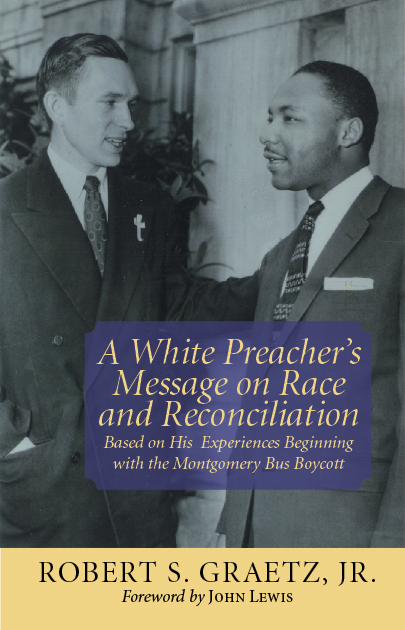 On the occasion of the recent 60th anniversary of the Montgomery Bus Boycott, NPR’s Michel Martin held an important and far-reaching panel discussion at the historical Dexter Avenue King Memorial Baptist Church, with a live audience and also aired live on NPR. Panelists included historian Taylor Branch, Alabama State University president Gwendolyn Boyd, Ebony Howard of the Southern Poverty Law Center, and Reverend Bob Graetz, pastor of Trinity Lutheran church during the boycott and author of A White Preacher’s Message on Race and Reconciliation (NewSouth Books, 2006).
On the occasion of the recent 60th anniversary of the Montgomery Bus Boycott, NPR’s Michel Martin held an important and far-reaching panel discussion at the historical Dexter Avenue King Memorial Baptist Church, with a live audience and also aired live on NPR. Panelists included historian Taylor Branch, Alabama State University president Gwendolyn Boyd, Ebony Howard of the Southern Poverty Law Center, and Reverend Bob Graetz, pastor of Trinity Lutheran church during the boycott and author of A White Preacher’s Message on Race and Reconciliation (NewSouth Books, 2006).
Martin noted that the Bus Boycott anniversary comes at a time in American history where the public has seen numerous acts of violence against African Americans both in mass shootings and police brutality. At the same time she pointed out that reactions to those events suggest rising activism and the birth of a new civil rights movement.
Branch pointed out similar contradictions at the beginning of the Civil Rights Movement. “The country was in a tremendous fix over the perpetual contradiction between slavery and American freedom. You had just had the Brown decision a year before in which eight white justices had said segregation was incompatible with American freedom. But nothing really had happened yet, except that the South had risen up against the ruling. And just a few months before the bus boycotts started, you had the Emmett Till lynching — a young man, roughly the same age as many of the activists who would later start the sit-ins and freedom rides, born in 1940, lynched at 14-years-old. … America was idealistic and yet raw and evasive on race.”
Branch and President Boyd also discussed the various origins of the Bus Boycott, including that Alabama State University teacher JoAnn Robinson and other female teachers used school resources to print flyers advertising the boycott, an act that risked their jobs, and also that the NAACP’s E. D. Nixon gathered local pastors to discuss the boycott, and these initiatives ultimately merged into the year-long movement. Boyd also discussed Rosa Parks’s role as NAACP secretary and how she and civil rights lawyer Fred Gray had discussed beforehand the need for a test case toward desegregating Montgomery buses, which Gray also relates in his memoir Bus Ride to Justice.
The panel discussion moved to issues of access to education for African American students, and Martin also brought in Karen Jones, credited as founder of the Black Lives Matter movement in Montgomery. Howard described a recent court case that she won banning the use of pepper spray to punish predominantly African American students in Birmingham, AL schools.
Rev. Graetz answered a number of questions submitted on Twitter during the event. One person asked how whites can work toward equality “without falling into white savior mindset,” to which Graetz advised, “Start where you are, and … look around and see what the situation is, and then you begin to ask yourself what can I do about it? What can I do to help this situation become improved. Oftentimes it will be some very minor thing … there are so many little things we can do.”
To a Twitter comment that there’s an absence of clergy leadership in current civil rights efforts, Graetz agreed and told that “regularly in the meetings of the board of the Montgomery Improvement Association, Dr. King would stand before us and say to us, ‘Some of us in this room are going to die. If you can’t deal with that, you shouldn’t be here.’ … Nobody ever left. I find it difficult to believe that in a comparable meeting of clergy today, when someone would pose that question to us … I doubt if we’d have the same response. I don’t think we’re ready to make that total commitment and total sacrifice as was the case in the people 60 years ago.”
As Martin concluded the discussion, Rev. Graetz offered this final thought: E. D. Nixon, the “grandfather for the movement … used to say we’re not doing this for ourselves, were doing this for the children coming on. That’s got to be our focus.”
The full discussion is available for listening from NPR. Rev. Robert Graetz’s memoir, A White Preacher’s Message on Race and Reconciliation: Based on His Experiences with the Montgomery Bus Boycott, is available in print and ebook from NewSouth Books or your favorite bookstore.
